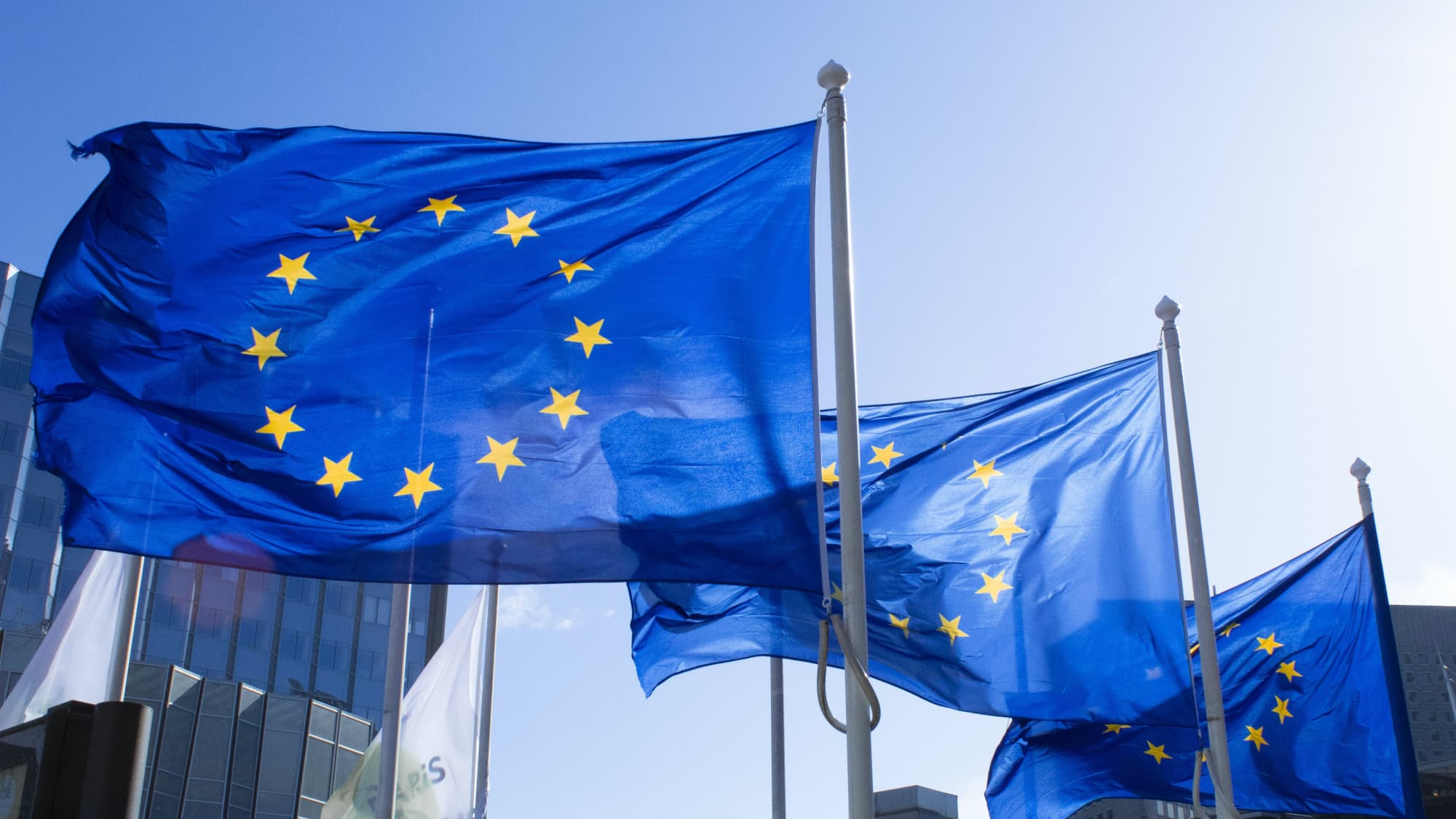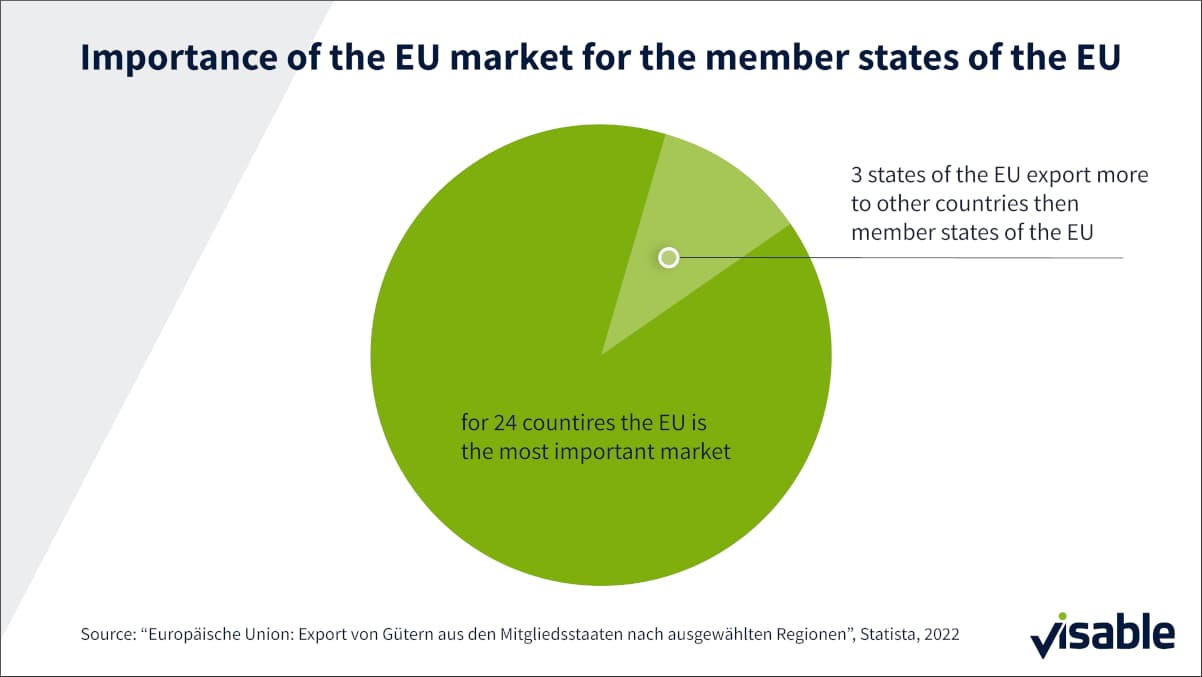For European companies, the EU zone is the most important sales market. In the year 2019, EU countries exported 67 per cent of their goods to other EU member states on average. If you want to expand into the European market, you should be well prepared. Check out these five recommendations for small- and medium-sized enterprises.

The significance of the European market for foreign trade
Europe is a strong economic zone which, due to the current conflicts raging across the world and the difficulties in coping with the effects of the Covid mandates, continues to gain significance – as both a manufacturing location and a sales market. Even if the growth potential in the EU zone is limited – for 24 to 27 countries of the European Union – the EU was the largest consumer in 2019. Only Cyprus, Ireland and Malta exported more goods to non-EU countries than to member states of the EU. With 76,7 per cent of exports going to other countries of the European Union, Slovakia records the highest share amongst all countries.

This means: if you want to spread out your business to Europe, you can profit on a large scale. However, not all expansion plans are actually successful. After all, what may work on the domestic market, may not necessarily run just as smoothly on the other side of the border.
For business success on European markets, good preparation and targeted information are essential. For instance, there are differences in business law and business practices in the EU and the EFTA states – and if you don’t consider these, you may end up making costly mistakes and lose profit. Companies have to face these and other challenges if they want to gain a foothold in Europe. EIC Trier GmbH (German), a globally active company providing an extensive range of information and consultation offers for successfully tapping into markets, has the following five recommendations for local companies who want to take the next step and venture out into Europe.
Capturing Europe as a sales market: 5 recommendations
1. Take advantage of offers for cultivating business contacts
Small- and medium-sized enterprises that want to expand into the EU must first consider how they want to organise their work there. For instance, by cultivating contacts, such as at trade shows, on collaboration exchanges or via the search for business partners with the Chambers of Commerce in the respective countries. What’s more, the EEN network of the EU Commission supports SMEs in conducting business or sales partner research within Europe, as well as in the search for suitable partners from EU countries for research and development projects.
2. Know the rules when it comes to international contracts
As there is not a generally accepted EU convention for the international sale of goods, it is also important for businesses within the EU to know the rules of the game when it comes to drawing up international contracts. For example, export contracts should contain any agreements on the methods of payment and delivery terms and conditions, on stipulations regarding the law to be applied and the jurisdiction, as well as on liability for defects and liability limitations. You also need to be careful when it comes to the valid inclusion of terms and conditions for doing business in other countries. If the exporter is not able to include their national law in the contract, they should thoroughly inform themselves of the particularities of the law applied in the country of the buyer and, in case of doubt, turn to an expert for advice.
3. Select the right sales channel to get started
If you cannot deliver your goods to customers directly, for instance because the company is not yet familiar enough with the market or the product is not suitable for direct sales, you can get support from sales partners. The most popular form of collaboration is via retailers who sell the goods in their own name and at their own expense. Well-established retailers are familiar with the product-specific sales routes and know how to serve the market. The disadvantage of this sales channel: as long as no other arrangements have been made between the exporter and the retailer, the customers in the target market remain unknown and the retailer’s sales margin lowers your profit.
An alternative, however less popular model, for selling in EU countries is via sales representatives, who ideally understand the target market, can search for customers for the company, foster business contacts and acquire contracts. The advantage: the company gets to know its customers better in this way. The disadvantage: the commission and perhaps the fixed remuneration for the sales representative lowers the profits of the exporter.
4. For advanced players: have your own sales employees and branches
From a profit of about 300,000 to 500,000 euros, it is worthwhile for you to organise your sales through your own sales employees in the EU, depending on the target market, according to EIC Trier GmbH. This means the labour laws and employee protection regulations of the respective country then need to be complied with. On top of this, the employer must pay taxes and social security contributions for the sales employees in the respective EU country of employment. For assistance with this, you can turn to tax offices and the respective Chambers of Commerce as service providers. The advantage of using sales employees is that they are personally under the control of the exporter and thus the sales can be steered according to the needs and wishes of the exporter. To ensure the comparably cost-intensive deployment of a sales employee in the EU also pays off, the selection and leadership of such employees, however, requires the necessary care as well as specialist and, frequently, intercultural competence. If you need help, you should get advice from experts and let them support you along the way. What’s more, the sales employee should not have the power of attorney to close deals, as this then means the establishment of a taxable business in the EU.
The establishment of an own sales branch, either as a subsidiary or as an independent company, should only take place when the sales potential for the product or service being sold is a sure thing. After all, this step is not only cost-intensive, it also involved tax law, labour law and the regulations from the civil and trade law books of the respective country. Comprehensive legal and tax consultation is critical to success when establishing a company in the EU.
5. Gain intercultural competence
The business cultures within Europe are quite different. This makes it important for the employees on site to gain intercultural competence. Whereas Germans and Swedes focus strictly on the day’s agenda during business meetings and highly value punctuality, countries where relationships play a central role, in particular, are much more flexible. Time-intensive business meetings with long discussions are therefore not rare in Spain. Despite this, when dealing with business partners from southern Europe, you should absolutely avoid giving them the feeling of being hurried up, as this is considered impolite. In contrast, in Sweden, it is important to get to the point at business meetings and not waste any time.
Generally speaking, Spaniards prefer personal, face-to-face communication to written or phone correspondence. Italians, too, prefer personal contact for starting up a dialogue. This is because the building-up of personal, trusting relations is central to business relationships in southern European countries. In contrast, business is strictly separated from pleasure in many countries of northern Europe.
Another cultural difference between southern and northern Europe is in the significance of power, hierarchy and emotions. While in southern Europe hierarchy and authority is highly important, power and hierarchy should not be demonstrated towards Swedish business partners. Southern Europeans show to be emotional and communicate quite a lot non-verbally during business meetings. Gestures, lots of hugs and kisses are not seldom. Swedes and other northern Europeans, however, hardly use any body language. To not come across as being cold and impersonal, northern Europeans should react in a relaxed way to the cultural peculiarities of southern Europeans. For instance, keeping distance is considered impolite in the south.
What’s more, Scandinavians and German tend to be very direct. In France, Luxembourg and Italy, however, is direct critique uncommon and can even do harm to business relationships.
What an entry on the B2B platform europages can do for you
If you have your sights on Europe as a sales market, you should also consider the B2B platform europages. This is the world’s largest international B2B procurement platform with products from more than three million companies. Here is where buyers from all over Europe can generate their own requests and hope for the matching offers.
In turn, sellers can set up a digital company profile on europages featuring the most important company facts (location, industry, business model, links to own websites), as well as publish requests and offers and manage these.
Numerous functions and statistics provide users with a host of information, including the number of impression, clicks and customer contacts. These and other data support the work of sales and marketing. europages has three million registered companies, offers service packages in 15 languages and covers markets in 28 countries.
